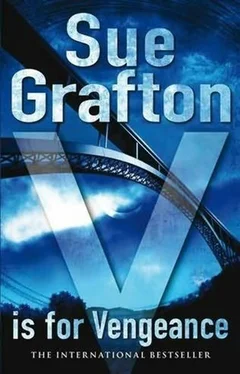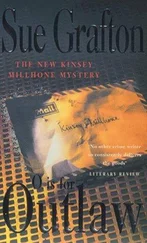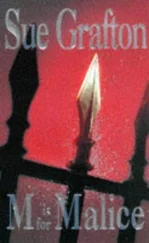Pinky was panting, his own breathing hoarse with rage and adrenaline. I looked back at Dodie, thinking she’d flattened herself on the floor so she could use the easy chair for cover. Then I saw the blood. One of Cappi’s rounds had ripped through the frame wall, which slowed the trajectory of the bullet but not by much. It was my turn to shriek with surprise, but the sound was reduced to one of simple disbelief. Pinky froze, taking in the sight of her. He couldn’t seem to grasp her condition from the evidence in front of him. As with me, it was the blood that finally registered.
He scrambled to her side and turned her over onto her back. She’d caught the bullet in her chest on the right-hand side. It looked like her clavicle was shattered and blood oozed dully from the wound. Pinky pressed both his hands over the area and his face turned up to mine in helplessness and horror. I skittered out of the room and headed down the hall to the kitchen, where I snatched the handset from the wall-mounted phone and hit 9-1-1. When the dispatcher picked up, I gave her the bare bones-the nature of the emergency and the location where the shooting had taken place. I put a hand over the mouthpiece and called to Pinky. “Hey, Pinky. What’s your street address?”
He hollered out the number, which I conveyed to her.
The dispatcher was methodical, repeating her questions in a matter-of-fact fashion until she was satisfied with the information I’d provided. In the background, I could hear a second dispatcher take another call. The woman I was talking to broke off long enough to initiate the emergency response, launching aid and assistance.
When I returned to the living room, the first thing I spotted was Pinky’s gun lying on the floor. With an ambulance on the way to the shooting scene, that was the last thing we needed to be dealing with. I picked up the gun and went out to the hall, where the floor was still littered with the stuff he’d tossed out in his haste to find his weapon. I didn’t have the time or inclination to tidy up, so I did the next best thing, which was to return to the living room and stash the gun under a couch cushion. Pinky saw me doing it, but neither of us wanted to worry about searching for a better hiding place.
St. Terry’s was less than four blocks away, which worked in our favor. I knelt beside Pinky and we did what we could for Dodie, whose chest was heaving. She was already trembling from shock and blood loss. I’m not sure she had any idea what had happened, but her complexion was pasty and her system was reacting with a series of shudders. I patted and coaxed and reassured her while Pinky babbled whatever comfort and encouragement came to mind. It was the language of alarm and stress, hysteria kept under control by sheer necessity. In that one instant, everything had gone wrong. With the photographs burned, I thought the worst had passed, but it had only begun.
I watched Dodie with a curious sense of detachment. She was conscious, and while she had no way to assess her situation, she knew she was in trouble. I believe that in such circumstances a victim can decide whether to choose life or to let it go. Whatever the severity of her wound, we could talk her into staying with us if she accepted what we said, which was she was fine, she was okay, that she’d make it, help was coming, that she was doing great, that we were with her. It was a litany of life-affirming promises, a pledge that she was safe, that she’d be whole again, fully mended, and without pain. She was teetering on the brink, the abyss opening up before her. I watched her look down into the dark hole of death and then her eyes rolled back into her head. I gave her hand a shake. She opened her eyes again and looked from my face to Pinky’s. A message passed between them, silent and intent. If he was capable of calling her back, I knew he was doing so. The question was whether she was capable of responding to his plea.
I heard sirens and moments later saw lights flashing beyond the living room windows. I left Pinky with Dodie and went to the door, waving my arms as though that might hurry them along. The miracle of emergency personnel is the calm response to situations that would otherwise disintegrate into chaos. There were four of them, all men and younger than seemed possible, a team of children with all the optimism of skill and training, four strong boys rising to the occasion. I could see Dodie taking in the sight of their faces, caring and kind. Even Pinky seemed soothed as they tended to the immediate first-aid measures. Pulse, blood pressure. One put in an IV line and another administered oxygen. The four of them wrapped her in blankets and lifted her onto the gurney. It was a practiced and smoothly coordinated effort, and she seemed to give up her confusion and surrender to their care as though reduced to infancy.
As soon as she was out the door, I put an arm around Pinky’s shoulder, which was both solid and oddly bony, a small man in a protective armor of muscle. As we emerged from the house, I noticed that his next-door neighbors had turned off their lights, not wanting to be roped in. I walked Pinky to my car and let him in on the passenger side. I made sure he was reaching for his seat belt so I wouldn’t slam his fingers in the door. I went around to my side and slid in under the wheel. I turned the key in the ignition, put the car in drive, and eased away from the curb. I thought I was speeding, but the car seemed to move at a crawl as I covered the distance from Pinky’s apartment to the hospital. There was no conversation between us, though I reached for his hand at one point and squeezed.
The ambulance had reached the ER ahead of us. I dropped Pinky at the door and told him I’d find parking. Dodie’s gurney disappeared through the sliding doors in a rolling flutter of white coats. She’d been swallowed up, leaving him behind. By the time I pulled into the nearby lot and scavenged the closest possible parking spot, my composure was fading and my heart had started to thunder. I grabbed my bag from the trunk and then jogged the half block back. The reception area was bright with overhead lights, and the waiting room was empty. Pinky was sitting in a glass cubicle with a woman in civilian clothing who was typing information onto a form, filling in the blanks as Pinky provided answers.
I took a seat, keeping an eye on the two until she’d finished with him. He looked miserable as he left the cubicle and plodded to the front door. I followed, watching as he sank to the steps outside with his head between his knees. I sat down beside him and we waited. It felt like two in the morning, but when I looked at my watch, it was only 8:35. This was a Tuesday night, and I was guessing the emergency-room personnel had been enjoying a respite from the usual weekend onslaught of the injured and half dead. I pictured cuts and bloody noses and allergic reactions, food poisoning, heart attacks, broken bones. Also, the host of minor illnesses that by rights should have been relegated to the nearest clinic the next day. We were lucky Dodie wasn’t having to compete for attention. Wherever they’d taken her, I knew she was in good hands. I got up and went inside, where the aide, a young black guy in scrubs, was sitting at the desk.
I said, “Hi. I’m wondering if you can tell us anything about Dodie Ford, who was brought in by ambulance a few minutes ago. Her husband’s been filling out the paperwork and I know he’d appreciate word.”
“I can check.” He got up and crossed to the double doors that opened onto the medical bays in back. The glimpse I caught of the interior showed two empty gurneys with the curtains pushed back along the tracks laid in the ceiling. There was medical apparatus at the ready, but no sign of nurses or doctors, and no sense of hubbub. The aide closed the door behind him and returned in less than a minute.
Читать дальше












